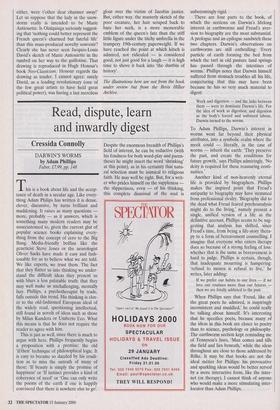Read, dispute, learn and inwardly digest
Cressida Connolly
DARWIN'S WORMS by Adam Phillips Faber, £7.99, pp. 148 This is a book about life and the accep- tance of death in a secular age. Like every- thing Adam Philips has written it is dense, clever, discursive, by turns brilliant and maddening. It raises as many questions — more, probably — as it answers, which is something many modern readers may be unaccustomed to, given the current glut of popular science books explaining every- thing from the concept of zero to the Big Bang. Media-friendly boffins like the geneticist Steve Jones or the neurologist Oliver Sacks have made it easy and fash- ionable for us to believe what we are told. We like experts, we trust them. The fact that they flatter us into thinking we under- stand the difficult ideas they present us with blurs a less palatable truth: that they may well make us unchallenging, mentally lazy. Phillips, a psychotherapist by trade, falls outside this trend. His thinking is clos- er to the old-fashioned European ideal of the widely read, questioning intellectual, still found in novels of ideas such as those by Milan Kundera or Umberto Eco. What this means is that he does not require the reader to agree with him.
This is just as well, since there is much to argue with here. Phillips frequently begins a proposition with a premise: the old 'if/then' technique of philosophical logic. It is easy to became so dazzled by his erudi- tion as to miss the untruth of many of these: 'If beauty is simply the promise of happiness' or 'If instinct provides a kind of coherence of need' or 'One can only write the poems of the earth if one is happily convinced that there is nowhere else to go'. Despite the enormous breadth of Phillips's field of interest, he can be reductive (with his fondness for both word-play and paren- theses he might insert the word 'shrinking' at this point), as in his certainty that natu- ral selection must be inimical to religious faith. He may well be right. But, for a writ- er who prides himself on the suppleness — the slipperiness, even — of his thinking, this complete dismissal of the soul is unbecomingly rigid.
There are four parts to the book, of which the sections on Darwin's lifelong interest in earthworms and Freud's aver- sion to biography are the most substantial. A prologue and an epilogue sandwich these two chapters. Darwin's observations on earthworms are still enthralling: 'Every particle of earth forming the bed from which the turf in old pasture land springs has passed through the intestines of worms.' Phillips notes that Darwin himself suffered from stomach troubles all his life, conjecturing that this may have been because he has so very much material to digest:
Work and digestion — and the links between them — were to dominate Darwin's life. For the idea of work as digestion, and digestion as the body's forced and unforced labour, Darwin turned to the worms.
To Adam Phillips, Darwin's interest in worms went far beyond their physical attributes, into a symbolic realm where the meek could — literally, in the case of worms — inherit the earth: 'They preserve the past, and create the conditions for future growth,' says Phillips admiringly. `No deity is required for these reassuring conti- nuities.'
Another kind of non-heavenly eternal life is provided by biographers. Phillips makes the inspired point that Freud's antipathy to biography may have stemmed from professional rivalry. 'Biography did to the dead what Freud feared psychoanalysis might do to the living,' namely present a single, unified version of a life as the definitive account. Phillips seems to be sug- gesting that analysis has shifted, since Freud's time, from being a life-story thera- py to a form of bereavement counselling. I imagine that everyone who enters therapy does so because of a strong feeling of loss: whether that is the same as bereavement is hard to judge. Phillips is certain, though, that inadequate mourning is hampering: 'refusal to mourn is refusal to live,' he writes, later adding:
If we prefer our habits to our lives — if we love our routines more than our futures — then we are fatally addicted to the past.
When Phillips says that 'Freud, like all the great poets he admired, is inspiringly inconsistent and muddled,' he could really be talking about himself. It's interesting that he specifies poets, because many of the ideas in this book are closer to poetry than to science, psychology or philosophy. The earthworm section kept reminding me of Tennyson's lines, 'Man comes and tills the field and lies beneath,' while the ideas throughout are close to those addressed by Rilke. It may be that books are not the ideal métier for Phillips: his provocative and sparkling ideas would be better served by a more interactive form, like the inter- net (or therapy). I cannot think of anyone who would make a more stimulating inter- locutor than Adam Phillips.


























































 Previous page
Previous page